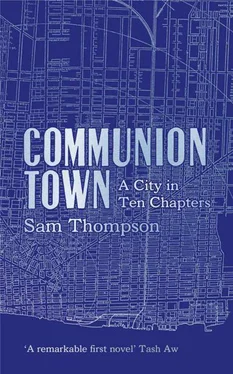One afternoon they parted on Ectarine Walk after she had spent half an hour debating with herself whether she dared make an expedition across the city to the Strangers’ Market. She wanted to browse the bookstalls, but feared that the effort of doing so might prove too much for her; she could not make up her mind. Simon had listened in mounting disbelief, his expression portraying concern, and he had asked sympathetic questions just as if he had nothing more important to worry about. Once she had disappeared into the house his face twisted into an ugly mask which churned on his skull all the way along the street.
And yet a few days later he went with her to the Market. Having finally made the decision, she was in a good mood, and as they surveyed the paperbacks she waved at the bald, flaccid man behind one of the smaller tables.
‘I always find something here,’ she said. ‘Henry has good taste.’
Astonishingly, the man lowered his eyes and shuffled his feet, his patchily shaven jowls wobbling. Simon had not imagined she could produce such a response even from so raddled a specimen. As Florence took her time over the stall, the man’s loose grey tongue pressed out between his varnished teeth and his eyes stayed on her. She glanced up and threaded a strand of hair behind her ear. When she looked away again the man’s face turned to Simon and twitched in a sort of pantomime, servile and insinuating at once, as if he was trying to share some lecherous joke. Simon was surprised by how badly he wanted to overturn the stall and break that pendulous nose; but then he saw that Florence had moved to another stall, and he hurried after her without replying. The fat man’s expression crumpled as he watched them leave.
The next time Simon was walking in Glory Part, fingers grasped his elbow, an oniony sweat smell enclosed him and the same sorry character greeted him like a bosom friend. It was a good thing they’d met again, he said, breathing heavily, because last time they had been interrupted. As Simon permitted himself a silent laugh at the kinds of difficulties she could get him into, the man launched into a story, some incoherent hard-luck tale about something bad which had happened to him: a mistake from which he had never recovered, the cause of his present state. Simon did his best not to hear, and after a few minutes he was able to get away by joining the flow of shoppers into the Part High metro — but he took with him the irrational unease that this meeting had somehow enmeshed him with Florence further.
Soon enough she wanted him to move into the house on Ectarine Walk, and although he squirmed when she asked him he was penned in by guilty obligation. He had let her continue happily in her fantasies for so long now. Besides, he had nowhere to go — a malicious landlord had given him notice on his tenancy — and Florence’s house was big enough, too big: it was full of the impediments of the past, heavy furniture and leather-armoured books and brown oil paintings, and when you came in from the street the hall closed over you like woodland. The wallpaper was a diagram of an overgrown garden and a giant cobweb of shadow hung always across the upstairs landing. When he arrived with his rucksack he felt a tingle of excitement at the sense that these rooms might carry on unfolding indefinitely, that the house might be the secret entrance to an underground world of limitless dim galleries and stairs. Only as he was unpacking did he realise that if Florence’s house had offered an image of escape, it had been nothing but a lure.
Living with her, he had grown baffled by the excuses she made for herself. In all this time he had never grasped what was really supposed to be the problem. The story, as far as he could make out, was that she had once had a viral infection and that ever since then she had been too tired to do anything. She suffered from an inconclusive catalogue of complaints — aching joints, the occasional fever — but all Simon knew was that she could lie despondent on the sofa for weeks on end.
Her more active periods were even more irksome. She fretted continually about tiring herself out, and was always fussing with a notebook in which she wrote down everything she did; she appeared to believe that walking to the shops was an achievement worth recording. The transparency of her tactics infuriated him as much as their success. When it suited her, she could manage well enough to go on daytrips into town, or cook complicated meals and insist that he eat them with her sitting up at the drop-leaf table in the dining room, but after a few weeks she would remember how tired she was meant to be and retreat to the sofa again. It still took Simon aback that she could behave like this in front of someone with a genuine affliction, but he said nothing. Soon enough, he reminded himself, it wouldn’t matter.
He ran down the front steps and set a smart pace along Ectarine Walk. Branches shook droplets on him as he walked, acid daylight stung his eyes and he thought of returning to Florence: he could apologise and lie in a darkened bedroom for the rest of the day, letting her press cool flannels on his forehead. He cursed himself for a faint heart and kept walking until he saw the green glass canopies of Lizavet Heath metro station.
He bought a ticket and went down to the platform. When he was small, he had liked travelling on the metro, the tramcar jogging him along tracks that stitched themselves through the city and led off into the hidden maze of all the places you could go. He had tried imagining that one day he would own all the trams, so that all of those destinations would belong to him too, but the idea had not convinced him even briefly. It felt more like his father’s than his own. His father had been a limited man who had made a lot of money in property and, having no real personality, had settled for the usual pretence: bluff, hard-nosed, no-nonsense. For years he had behaved as though Simon was incapable of managing anything for himself, but later he had refused to support his son in the smallest way, laying down platitudes instead about how we all have to learn to stand on our own two feet. Then he had gone bankrupt.
Simon rode the metro over to Sweatmarket station and climbed through chipped tiling and wet concrete up to the streets of Glory Part. He crossed a footbridge and turned down Sluice Lane. He had lived in digs near here for a couple of months, at one time, and had never forgotten it. The landlady had chewed raw garlic for her blood pressure. The kitchen had barely been large enough for an electric kettle, a hotplate and a cupboard smelling of mildew; there was a view of the canal. Sliding open the drawer, he’d discovered a lone fork, the tines bent in four slightly different directions and the handle stamped Not to be removed from hospital . In the early mornings that room had been bright, and crammed with a sense of promise so pure it was hard to bear, like a sound pitched at the limit of hearing.
He was angry with Florence for spoiling his departure from the house. By rights, all he had to do was walk until the day ended — the afternoon was already dimming — and keep walking for as long as it took, a pilgrim thinking only of his journey, on faith, letting the rest of his life fall away. But instead he was rattled and distracted. She had done it again. To settle his mind he walked fast in no particular direction until he emerged from the alleys to the quays.
The waterfront was in the process of redevelopment. They had laid tiny, pastel-coloured paving stones, planted blue bollards, and put up a bronze image of a stevedore hauling a rope. Most of the gutted buildings were dressed with scaffolding, but a few restaurants and shops were ready, their dim interiors poised for customers. The sky, overcast and unsettled, was opening itself in an endless slow gesture to the waves. The waterfront was empty except for a man slumped on one of the benches. Simon cursed: he had grown accustomed to ducking down the side streets of Glory Part whenever he saw that grey face approaching, but this time he was caught in the open. Before he could turn on his heel, the figure on the bench raised a hand and began to get up. Simon walked on past, ignoring the cry of abject greeting and the snagging of fingernails on his sleeve. As he hastened away from the quays the fat man shambled after him, still calling out as if to start a conversation.
Читать дальше
Конец ознакомительного отрывка
Купить книгу












